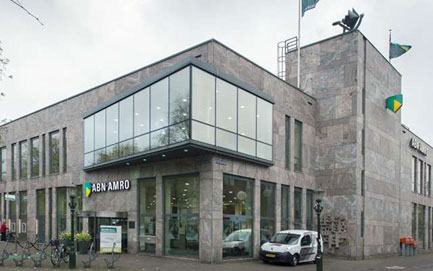BRAM TIJSSELING
Financial Services Partner at the Amsterdam office of Odgers Berndtson

As purpose-led organizations and leadership styles prove attractive to young talent, investors and collaborators, how is the financial services industry keeping pace with this trend? Bram Tijsseling, Financial Services Partner, Odgers Berndtson, Amsterdam, spoke to Rintse Zijlstra, Head of Strategy and Sustainability at ABN AMRO, for his insights.
It has become clear that a business with a clear purpose, whether it’s through sustainability, fighting poverty, inclusive financing or other priorities, is increasingly likely to attract business opportunities, investors and talent.
At Odgers Berndtson executive search, we see more and more clients considering purpose as an important differentiator, both from a company and candidate perspective.
Simply put, the company needs to have a purpose and the leadership team needs to demonstrate behaviour that is aligned with that purpose and its values. If successful, that will mean a candidate, in turn, will pick an employer, based on a purpose with which they can identify.
Where this comes together, great results can be achieved. In the Netherlands, we have seen some great examples, like Unilever. Their CEO is demonstrating a brand of purpose-led behaviour which is attracting talent that believes in their chosen purpose, ultimately resulting in improved financial results.
Before providing an example of creating a purpose for one particular financial institution, let’s look at the underlying reasons why purpose is gaining traction in the sector.
X, Y and a new equation
The current leadership and workforce, Generation X (1966-1980) and Y (>1981), grew up in relatively good economic times and are working hard, building great careers. Despite that, they are also are asking themselves the question: ‘Is this it?’
A sense of purpose and belonging can answer that question for this new leadership talent.
In Financial Services, after the global financial crisis of 2008, the focus was on implementing regulation and moving the culture away from a product-centric to a customer-centric approach.
Now, while there is still a heavy regulatory agenda and customer experience remains important, purpose is entering the equation.
As financial products have become commodities and customer experiences can be copied in mere minutes, purpose and doing good is an additional factor to consider. It is a valuable opportunity for financial institutions to differentiate themselves, create business opportunities and attract talent.
Purpose and sustainability in practice
Rintse Zijlstra, Head of Strategy and Sustainability at ABN AMRO, is amongst others responsible for delivering the bank’s sustainability agenda.
ABN AMRO has identified sustainability as a key pillar of its strategy. It truly believes that this is a differentiating factor in the current environment. The bank is working on many initiatives and activities for a more sustainable economy.

Source: Pexels.com
One initiative relates to the sustainability of real estate. As one of the largest mortgage providers in the Netherlands, the bank offers advice, tools and products to help home-owners make their property more sustainable.
Within corporate real estate, ABN AMRO has launched several initiatives in recent years to make properties more sustainable. The ambition is to reach an average energy label A by 2030 for the homes and buildings that ABN AMRO finances. In addition, ABN AMRO’s goal is to finance 100 circular loans to facilitate the transition to a circular economy.
Attracting attention
Rintse explains that, internally, sustainability is increasingly getting more attention and creating positive energy amongst the bank’s workforce.
For attracting new leadership and talent, it is not yet considered to be a decisive factor to join ABN AMRO. However, it’s definitely having a positive influence on their decision.
“ABN AMRO has adopted a modest approach in profiling sustainability as a key strategic pillar. It believes in showing results first, rather than simply talking about it. Also given the size of our balance sheet, our approach is not to be a sustainability saint, but to have a sustainable impact on society. Just like myself, as an individual, I am not a sustainability saint, either. I do well in certain areas, but not all. For instance, I’ve insulated my house, go by train to work, eat less meat at home, yet I still take a plane to go on holiday and own a gasoline-fuelled car.
“At ABN AMRO, we are in transition and want to do better every year. Also, we aim to support our clients in starting a sustainable transition journey.

First energy-neutral bank office Source: www.abnamro.nl
“Based on external qualifications, ABN AMRO is increasingly getting recognised for its efforts in sustainability. Evidence for this includes the Investor Award at the Circular Economy Awards, 2017 Silver Sustainability Award, a top 5% rating in the Dow Jones Sustainability Index, and more.
“Ultimately, it would be great if we, as the leadership team, are able to transform ABN AMRO into a more sustainable organisation, whilst continuing to serve our customers well.

Highest wooden residential building Source: www.abnamro.nl
“Meeting client needs whilst improving the environment in which we all live in, would make us feel proud,” concludes Rintse.
Where executive search can help
Leading an organisation towards its purpose requires the right leader to take responsibility and demonstrate the appropriate behaviours.
At Odgers Berndtson, we aim to advise clients on identifying those leaders, and add value in three ways:
- By contributing to insights on the types of leadership that are needed to realise the transformation agenda and define and guide organisations towards their purpose
- By helping to improve the performance of the leadership team as a whole. Success has its roots in the diversity of skills, experience and backgrounds in a team, and its legitimacy to address behaviour. It’s not just about skills or competencies. An organisation’s purpose and ambition is ultimately the main driver of management’s behaviour, legitimacy and performance.
- By finding the right personalities who fit with the purpose and responsibilities of the organisations and can really make a difference. We aim to find individuals who create the right stories and demonstrate the leadership style that will motivate an organisation to embrace purpose and drive long-term success.
If you would like to discuss the rise and impact of purpose, and how it might impact your leadership needs or career, please get in touch.
Bram Tijsseling is a Financial Services Partner in the Amsterdam office of Odgers Berndtson and a member of the Global Banking Practice. He focuses on senior management and non-executive assignments for financial institutions. He advises clients in search of leadership teams to realise the transformation within the context of the organisation, the strategic agenda and its purpose. Prior to joining Odgers Berndtson, Bram worked for over 15 years for EY in Europe, the Middle East and Asia. He started his career as an External Auditor.
Bram is a Certified Public Accountant in the Netherlands, holds a Masters degree in Auditing and Accounting from Nyenrode Business University, and an MBA from IE Business School in Madrid.
SEE ALSO: TOP-5 robots working in banks









